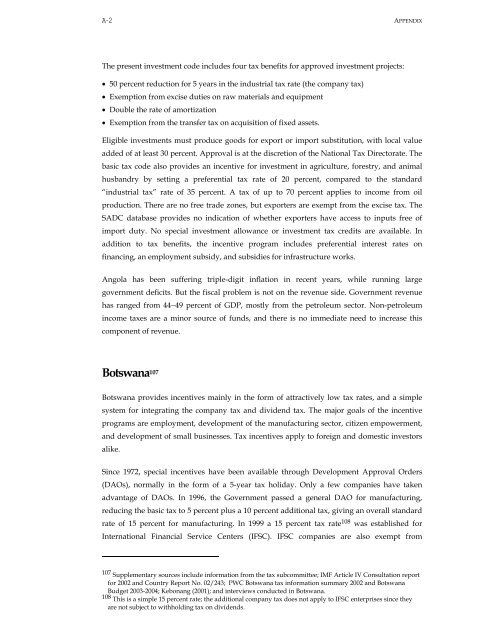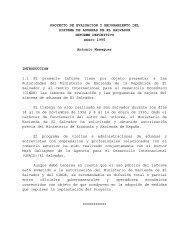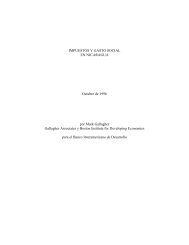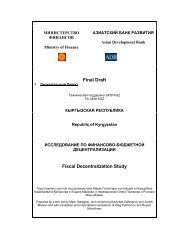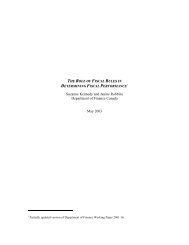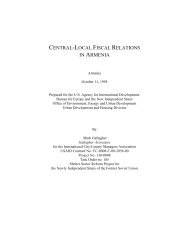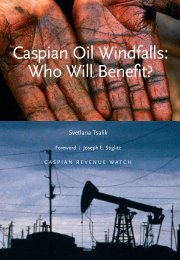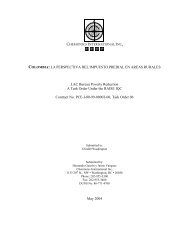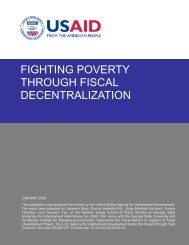Effectiveness and Economic Impact of Tax Incentives in the SADC ...
Effectiveness and Economic Impact of Tax Incentives in the SADC ...
Effectiveness and Economic Impact of Tax Incentives in the SADC ...
Create successful ePaper yourself
Turn your PDF publications into a flip-book with our unique Google optimized e-Paper software.
A-2 APPENDIX<br />
The present <strong>in</strong>vestment code <strong>in</strong>cludes four tax benefits for approved <strong>in</strong>vestment projects:<br />
• 50 percent reduction for 5 years <strong>in</strong> <strong>the</strong> <strong>in</strong>dustrial tax rate (<strong>the</strong> company tax)<br />
• Exemption from excise duties on raw materials <strong>and</strong> equipment<br />
• Double <strong>the</strong> rate <strong>of</strong> amortization<br />
• Exemption from <strong>the</strong> transfer tax on acquisition <strong>of</strong> fixed assets.<br />
Eligible <strong>in</strong>vestments must produce goods for export or import substitution, with local value<br />
added <strong>of</strong> at least 30 percent. Approval is at <strong>the</strong> discretion <strong>of</strong> <strong>the</strong> National <strong>Tax</strong> Directorate. The<br />
basic tax code also provides an <strong>in</strong>centive for <strong>in</strong>vestment <strong>in</strong> agriculture, forestry, <strong>and</strong> animal<br />
husb<strong>and</strong>ry by sett<strong>in</strong>g a preferential tax rate <strong>of</strong> 20 percent, compared to <strong>the</strong> st<strong>and</strong>ard<br />
“<strong>in</strong>dustrial tax” rate <strong>of</strong> 35 percent. A tax <strong>of</strong> up to 70 percent applies to <strong>in</strong>come from oil<br />
production. There are no free trade zones, but exporters are exempt from <strong>the</strong> excise tax. The<br />
<strong>SADC</strong> database provides no <strong>in</strong>dication <strong>of</strong> whe<strong>the</strong>r exporters have access to <strong>in</strong>puts free <strong>of</strong><br />
import duty. No special <strong>in</strong>vestment allowance or <strong>in</strong>vestment tax credits are available. In<br />
addition to tax benefits, <strong>the</strong> <strong>in</strong>centive program <strong>in</strong>cludes preferential <strong>in</strong>terest rates on<br />
f<strong>in</strong>anc<strong>in</strong>g, an employment subsidy, <strong>and</strong> subsidies for <strong>in</strong>frastructure works.<br />
Angola has been suffer<strong>in</strong>g triple-digit <strong>in</strong>flation <strong>in</strong> recent years, while runn<strong>in</strong>g large<br />
government deficits. But <strong>the</strong> fiscal problem is not on <strong>the</strong> revenue side. Government revenue<br />
has ranged from 44−49 percent <strong>of</strong> GDP, mostly from <strong>the</strong> petroleum sector. Non-petroleum<br />
<strong>in</strong>come taxes are a m<strong>in</strong>or source <strong>of</strong> funds, <strong>and</strong> <strong>the</strong>re is no immediate need to <strong>in</strong>crease this<br />
component <strong>of</strong> revenue.<br />
Botswana 107<br />
Botswana provides <strong>in</strong>centives ma<strong>in</strong>ly <strong>in</strong> <strong>the</strong> form <strong>of</strong> attractively low tax rates, <strong>and</strong> a simple<br />
system for <strong>in</strong>tegrat<strong>in</strong>g <strong>the</strong> company tax <strong>and</strong> dividend tax. The major goals <strong>of</strong> <strong>the</strong> <strong>in</strong>centive<br />
programs are employment, development <strong>of</strong> <strong>the</strong> manufactur<strong>in</strong>g sector, citizen empowerment,<br />
<strong>and</strong> development <strong>of</strong> small bus<strong>in</strong>esses. <strong>Tax</strong> <strong>in</strong>centives apply to foreign <strong>and</strong> domestic <strong>in</strong>vestors<br />
alike.<br />
S<strong>in</strong>ce 1972, special <strong>in</strong>centives have been available through Development Approval Orders<br />
(DAOs), normally <strong>in</strong> <strong>the</strong> form <strong>of</strong> a 5-year tax holiday. Only a few companies have taken<br />
advantage <strong>of</strong> DAOs. In 1996, <strong>the</strong> Government passed a general DAO for manufactur<strong>in</strong>g,<br />
reduc<strong>in</strong>g <strong>the</strong> basic tax to 5 percent plus a 10 percent additional tax, giv<strong>in</strong>g an overall st<strong>and</strong>ard<br />
rate <strong>of</strong> 15 percent for manufactur<strong>in</strong>g. In 1999 a 15 percent tax rate 108 was established for<br />
International F<strong>in</strong>ancial Service Centers (IFSC). IFSC companies are also exempt from<br />
107 Supplementary sources <strong>in</strong>clude <strong>in</strong>formation from <strong>the</strong> tax subcommittee; IMF Article IV Consultation report<br />
for 2002 <strong>and</strong> Country Report No. 02/243; PWC Botswana tax <strong>in</strong>formation summary 2002 <strong>and</strong> Botswana<br />
Budget 2003-2004; Kebonang (2001); <strong>and</strong> <strong>in</strong>terviews conducted <strong>in</strong> Botswana.<br />
108 This is a simple 15 percent rate; <strong>the</strong> additional company tax does not apply to IFSC enterprises s<strong>in</strong>ce <strong>the</strong>y<br />
are not subject to withhold<strong>in</strong>g tax on dividends.


